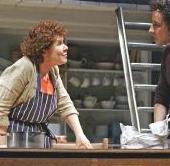SITE GUIDE
SEARCH
REVIEWS
FEATURES
NEWS
Etcetera and
Short Term Listings
LISTINGS
Broadway
Off-Broadway
NYC Restaurants
BOOKS and CDs
OTHER PLACES
Berkshires
London
California
New Jersey
DC
Philadelphia
Elsewhere
QUOTES
TKTS
PLAYWRIGHTS' ALBUMS
LETTERS TO EDITOR
FILM
LINKS
MISCELLANEOUS
Free Updates
Masthead
Writing for Us
A CurtainUp  London Review
London Review
 London Review
London ReviewThere Came a Gypsy Riding
|
Can you imagine this night if there had been drink involved?
— Leo |

Imelda Staunton as Margaret and Aidan McArdle as Simon
(Photo: John Haynes) |
Imelda Staunton and Elaine Atkins play the dominant older female figures. One has married, left her poor background behind, had children and works as a university lecturer in English Literature in Dublin. The other has lived where she has always lived, values what she has always valued and comes from an Ireland imbued with tradition and superstition.
It is worth remembering how close these characters are to Frank McGuinness himself, who comes from County Donegal and who teaches English at Trinity College, Dublin's premier university. Maybe because he puts his own experiences into his words is what makes his writing work so well.
The play is set at the country home of Leo (Ian McElhinney) and his wife Margaret (Imelda Staunton) where they have gathered with their two grown up children Louise (Elaine Cassidy) and Simon (Aidan McArdle) on what would have been the 21st birthday of their son, Gene, who committed suicide two years before. So this celebration is as much about the pain of Gene's death and the devastating effect it has had on his closest relations. Gene's body was found by Cousin Bridget (Eileen Atkins) an eccentric spinster and loner (although in the true tradition of witches, or "confused fairy" as she describes herself, she tells us that she was married to the Devil). Bridget takes two years to give his family the letter that she found in Eugene's coat pocket and this letter is handed over as the first act of the There Came a Gypsy Riding closes.
Margaret is the central character. She lectures on the poetry of John Keats and she feels too that her son Eugene was born to die young. There is a feeling of fatalism in her perception of his death. She sees in his simple note a list of the names of Gene's immediate family, and by his own name the date of his birth and the date of his death, a superstitious curse which has more to do with the mysticism of Donegal than the logic of literary analysis. Much of Margaret's dialogue gives us the fine detail of her remarkable autobiography, how she was whacked by her father, how she struggled to get an education, how she got a job by pretending she wasn't married with children. She is a marvellous character but never relaxed enough to be likeable. For a practical person, she puts little emphasis on Gene's drink and drugs and gambling habits, almost never asking why he got that way, instead preferring to concentrate on the romance and fate of dying young.
Eileen Atkins is zany and quirky as Bridget, whether she is careering round the stage steadying herself, not with a walking frame but with an abandoned toddler's buggy or delivering some of McGuiness' best and sardonically witty lines of the play. Michael Attenborough has got ace performances out of both these women and indeed from the supporting cast.
Elaine Cassidy is a name to look out for, as troubled and brittle primary school teacher Louise who was close to her brother. The always watchable Aidan McArdle turns in a good performance as the introspective and awkward Simon, a bookseller who has already made a far reaching decision about his future after the suicide of his brother. Ian McElhinney is a successful man, a builder and now owning a very successful pub chain but who is faced with the emasculation of a situation that cannot be fixed with money.
Robert Jones' set has a Scandinavian air to it with its farmhouse kitchen and open loft bedroom, and to the side, a tree with its stylised exaggerated branches stretched out across an open sky. It feels windblown and cold.
The death of her son exposes Margaret's family to deep fissures running just beneath the surface and McGuinness describes these like a poet. As Margaret rips up the letter she intones, "Confetti, darling, not for your wedding but for your burial, your last resting place . . . . you were born for death, my mortal child."
|
THERE CAME A GYPSY RIDING
Written by Frank McGuinness Directed by Michael Attenborough Starring: Eileen Atkins and Imelda Staunton With: Elaine Cassidy, Aidan McArdle, Ian McElhinney Design: Robert Jones Lighting: Paul Pyant Sound: Paul Arditti Movement: Lynn Page Running time: Two hours and 5 minutes with one interval Principal Sponsor: Coutts Season Sponsor: Cadwaladers Production Sponsor: Aspen Re Aspen Insurance Box Office: 020 7359 4404 Booking to 3 March 2007 Reviewed by Lizzie Loveridge based on 18th January 2007 performance at the Almeida Theatre, Almeida Street, Islington, London N1 (Tube: The Angel, Islington) |
|
London Theatre Tickets Lion King Tickets Billy Elliot Tickets Mary Poppins Tickets Mamma Mia Tickets We Will Rock You Tickets Theatre Tickets |




